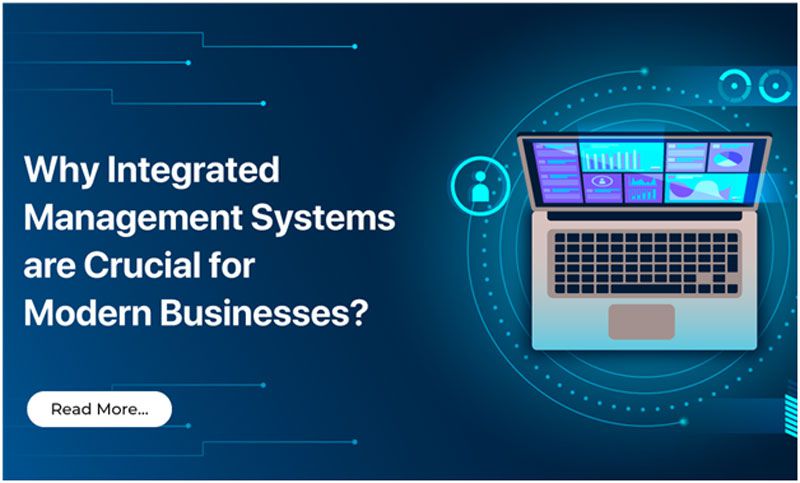In the dynamic landscape of today’s business world, the effective utilization of advanced technologies is paramount for success. The traditional approach of relying on separate management systems for various aspects of operations is no longer efficient.
The adoption of Integrated Management Systems (IMS) is more crucial than ever for businesses aiming to outperform competitors and ensure profitability.
Continue reading to delve into the significance of IMS and understand why businesses across diverse industries should seriously consider integrating them into their operations. For comprehensive services to enhance safety and performance, including cybersecurity, managed IT, cloud solutions, and software development, reach out to the experts at Effivity.
Decoding Integrated Management Systems (IMS)
An Integrated Management System (IMS) stands as a sophisticated amalgamation of an organization’s various systems, standards, and processes into a unified smart system, emphasizing the importance of Quality Assurance.
This integration not only streamlines management but also saves time, significantly boosting efficiency by comprehensively addressing all elements of the system as a cohesive whole. A well-constructed IMS becomes the linchpin, eliminating the need for managing multiple systems separately and, in turn, enhancing the overall operational effectiveness.
Components of Integrated Management Systems
IMS incorporates various elements, including:
1. Quality Management System (QMS): Manages production, development, and service aspects, ensuring adherence to consumer needs.
2. Environmental Management System (EMS): Focuses on reducing environmental impacts while increasing operational efficiency.
3. Safety Management System (SMS): Ensures the health and safety elements of a business are in check through systematic processes.
4. Food Safety Management System (FSMS): Ensures adherence to specific procedures to keep food products safe for consumption.
5. Information Security Management System (ISMS): Manages information security, crucial for industries handling sensitive data.
Goals of Integrated Management Systems
IMS implementation aligns with several key goals:
Performance: Boosts efficiency to provide better products and services while promoting employee health and safety.
Speed: Saves considerable time through streamlined procedures, enabling senior staff to focus on critical aspects.
Cost-Effectiveness: Results in cost-effective processes, optimizing resources for improved company performance.
Consistency: Simplifies systems, creating coherent processes and defined objectives for success.
Communication: Facilitates quick and easy communication between systems and responsible personnel.
Security: Enhances security by focusing on fewer, more effective security measures.
Why Integrated Management is Imperative Now?
In an era of intense market competition, Integrated Management Systems (IMS) offer a multitude of benefits, including increased efficiency, enhanced productivity, and the ability to save valuable time and money.
Businesses that neglect tools like IMS, especially those emphasizing integration with Aircall, risk falling behind in terms of productivity and quality. To secure your business’s financial future, consider exploring the comprehensive services offered by Effivity.
Embrace Integrated Management Systems to thrive in the competitive business landscape, ensuring your business remains efficient, secure, and optimized for success.
Expanding Horizons: The Impact of IMS on Different Industries
Manufacturing Sector
In manufacturing, where precision and efficiency are paramount, IMS ensures seamless coordination of production processes. From quality control to supply chain management, IMS streamlines operations, leading to higher product quality and faster time-to-market.
Healthcare Industry
In healthcare, patient safety is non-negotiable. IMS plays a crucial role in managing various processes, from patient records to equipment maintenance. This results in enhanced patient care, reduced errors, and improved overall efficiency.
IT and Technology
For IT companies, data security is a top priority. IMS, especially ISMS, provides a robust framework for managing and securing sensitive information. This not only safeguards the organization but also builds trust with clients.
Service Sector
In the service sector, customer satisfaction is the key to success. IMS, with its focus on consistency and communication, ensures that service delivery is standardized and meets customer expectations. This leads to increased customer loyalty and positive brand reputation.
Challenges and Solutions in IMS Implementation
Resistance to Change
One common challenge in IMS implementation is resistance to change. Employees may be accustomed to existing systems and processes. Overcome this, organizations need to invest in comprehensive training programs and clearly communicate the benefits of IMS adoption.
Integration of Legacy Systems
For established businesses with legacy systems, integrating IMS can be a complex task. However, phased implementation and strategic planning can help in a smooth transition. It is essential to conduct a thorough analysis of existing systems and create a roadmap for integration.
Continuous Improvement
IMS is not a one-time implementation but requires continuous improvement. Regular audits, feedback mechanisms, and a commitment to ongoing refinement are crucial. This ensures that the system evolves with the changing needs of the organization and the industry.
Conclusion: Navigating the Future with IMS
In conclusion, the adoption of Integrated Management Systems is not just a trend but a strategic necessity for businesses aiming for long-term success. The impact of IMS extends beyond operational efficiency; it shapes the culture of an organization, fostering a commitment to quality, communication, and security.

Namaste UI collaborates closely with clients to develop tailored guest posting strategies that align with their unique goals and target audiences. Their commitment to delivering high-quality, niche-specific content ensures that each guest post not only meets but exceeds the expectations of both clients and the hosting platforms. Connect with us on social media for the latest updates on guest posting trends, outreach strategies, and digital marketing tips. For any types of guest posting services, contact us on info[at]namasteui.com.

